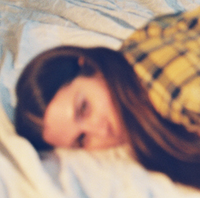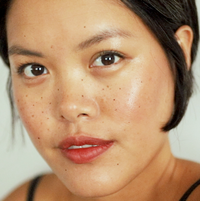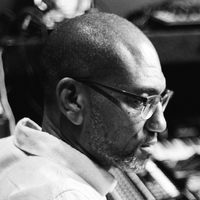As told to Jeffrey Silverstein, 2654 words.
Tags: Music, Success, Money, Day jobs, Mental health, Inspiration.
On seeing your ideas through
Musician Gia Margaret discusses not worrying about boundaries in your work, making use of intuition, being a fan of quiet, and coming to know yourself through the things you make.There’s often a negative connotation associated with quitting. Your decision to step away from music school seems to have yielded a net positive. Could you describe what that decision felt like and its impact on your trajectory?
It was so long ago. I dropped out of music school 13 or 14 years ago. At the time I felt incredibly discouraged. I felt jaded about music because I felt like my professors weren’t rooting for me. I wasn’t a great student. I loved making music, but didn’t like the academic part of theory. I was so bad at it. At the time I wanted to write movie scores, but was having a hard time in my classes so I dropped out. It took me a while to start playing music again.
I became a dental assistant and paid off my loans. I was still writing and playing on my own, but I didn’t think I’d ever have a career in music. I kind of put it on the shelf. Ultimately it was a good decision because I was forced to learn things on my own, which is how I like to learn anyway. There was a lot of trial and error in my 20s. I didn’t make my first record until I turned 30. I was more inclined to dip my toes into the Chicago scene and became more confident as a writer, as opposed to a composer. Originally I wanted to be more in the classical or composing world. I still love composing and am getting back into piano. I felt like I couldn’t play piano for years.
Was there pressure to validate your decision to friends or family?
Yeah, I think I felt the need to finish college. I felt like a failure because I dropped out of school and I tried to go back for early childhood education and even thought about going to dental school. I could never commit to it. I was afraid to admit that I had my heart set on pursuing music. I just wasn’t sure how I was going to do it. I continued to take odd jobs and just get by, keeping my head down. I never stopped digging, but it took me a while.
Has it been a challenge to explain being a musician as a ‘real’ job?
It hurt my feelings more when I was younger. Looking back, I realized my family was just worried about me. They really didn’t know, because they weren’t artists and they never had to pursue anything that was out of the norm, so they just didn’t understand that it was a possibility for me.
Also I think they just didn’t want to see me struggle. It was hard to explain, because I didn’t even know how I was going to do it. It was hard for me to make my point. They were always trying to encourage me to stay in school and just, you know, continue with music. They never discouraged me from making music, but they wanted me to have a backup plan, which I never had.
It’s still difficult trying to explain what I do to people in my family. The reality is I do make a living from music and am incredibly lucky and love what I do. I wouldn’t change it. Is it the most lucrative career? No, but I feel very successful that I can pay my rent and do what I love. That’s enough for me.
It takes time to confidently identify as a musician, painter, etc. I’m curious what factors help or hinder that process.
I felt a lot of shame for it. At the end of 2018 I quit my last real job. I was working for a tech company and it was awful. I hated my job, but I was booking all these tours, and I just knew that I couldn’t keep up with both. If I’m going to take a risk, I’m going to lose this job, but at least I have some work lined up and hopefully more work follows. That was a jump-off-the-cliff moment for me. I either do this or I keep this tech job, stay in Chicago, and give up on everything. So I made the jump, but didn’t tell my family I quit my job for around six months. I was like, hey, I quit my job, I’m a musician now.
It ended up being great. I’m really glad I took that risk. Even still, when I see people or family and they ask me what I’m doing for work, I shudder a little when I tell them I’m a musician. I feel there’s so much negative connotation that goes behind that, like you’re lazy or something.
It’s easy to assume musicians who’ve attained a certain level of success feel secure in that way all the time.
No, and there’s no security either. It’s fine for now, but sometimes I wake up in the middle of the night and am like, what am I going to do if next year I can’t pay my rent?
Let’s go back to having someone rooting for you. You’ve mentioned finding your place in Chicago was challenging until you linked up with Orindal Records. What was missing and what changed?
I’ve always made really quiet music. It was sometimes hard for me to play shows. I’d book these shows and open for loud bands or play in loud rooms. I felt like a real misfit for a while. I still kept making my music and found a home for myself online. I was posting YouTube covers and original songs on SoundCloud and finding all these people that appreciated it. It felt more validating than playing in a loud bar where no one is listening to you.
I was finding more confidence in myself because I’m pretty introverted. It felt like an easier way for me to share music and still have an autonomous life. I even crave that now. I love putting stuff on the internet. I love releasing music. Playing shows can be a bit difficult energetically. It’s hard for me to keep up.
After a while that gets lonely. I started to want more community in my life. To go to more shows, to be more inspired. I was working at the Old Town School and Owen from Advance Base was playing. I took my dinner break, popped in and watched him play. That’s how I found out about his label. I picked up a sampler and felt deeply connected to all of the music. I was like, wow, this is a place for gentle weirdos like me, I would love to be on this label.</span>
I didn’t have the courage to send him my music or anything like that. I just started to go to all the Orindal shows. Anytime an artist came through town, I would go and that’s how Owen and I started talking. I think he invited me to open for one of the artists. We became friends after that. It was a real turning point for me as far as feeling a part of something and having more confidence to play shows and be on stage.
What benefits do you associate with producing your own music?
The benefit of producing your own music is you’ll always be happy with it. You’ll never have to fight for a part and you’ll never really butt heads with anyone. I like producing my own music because it allows me to live in my own world for a little while. It’s exciting to experience the birth of a song and then watch it blossom into this bigger, breathing thing.
Knowing that you were a guiding force.
Knowing that you followed an idea intuitively instead of looking for someone else to make it better. That’s not to say I don’t want to work with producers ever, but I’ve always connected so much more to my own production.
I’ve tried to work with people and am always more attached to my demos. Another benefit of producing your own music is learning more about yourself and acquiring more skills. I have to Google how to do something every time I try something new. I learn something and I think that’s great. It gives me more power as a writer because I have more tools.
I’d imagine it helps with communication, too.
Yeah. There are things I’m so comfortable saying I’m bad at. It’s easier for me to know exactly what I want and how to communicate that with whoever I’m collaborating with.
Do you set any limitations or boundaries when writing?
I don’t think about not having boundaries. This is how I’ve made both records - every song calls for something different. I’ve never been too concerned with a project being cohesive. A collection of songs belong together just in relation to what I’m going through in my life. I’m all across the board, like my musical interests. Sometimes it’s hard for me to put myself in any corner.
At the end of the day, if you’re making a record, you are the glue that will hold it together. Your ideas go hand-in-hand. Even when I have a bad idea, it informs a better one and I don’t discredit it.
Are there circumstances that help you enter a flow state?
I’m still trying to figure out if there are things that can help me get there. Whenever I’m not writing, I feel terrible. I don’t realize until later, until I’m actually writing, that I needed that time to incubate. Like I needed to—I don’t want to say suffer because I’m not trying to suffer all the time—but I don’t know, I need to cultivate life experience. Sometimes there are moments when you’re not writing and that’s okay. That’s a good time to study music and listen to things you like and do a bunch of journaling.
All of those things matter.
Yes. The songwriting is the last element of me processing anything. I have to obsess over it for a while. I have to grieve. I have to celebrate something and fully experience it before I can write about it.
It’s nice that you’re naming listening to music as part of the process.
Yeah, absolutely. There is something commendable about sitting down every day and trying. Sometimes you can get in a rut of not doing and thinking about doing. I’ve been reading that Jeff Tweedy book, How To Write One Song. I was just feeling like, ugh, I’m stuck. I haven’t written anything in like a month. He mentions playing guitar before bed, coming up with an idea, and then waking up in the morning and continuing. I started to do that.
I came up with two solid song ideas from that process. I realized this is something I can do when I feel like making music, but don’t feel super inspired to pour out all my feelings. It’s a good starting point, but my favorite songs are the ones that just come out of nowhere and I’m just like, whoa, I didn’t even try to do that and that happened.
That must feel empowering.
That’s a big part of it, too. Trusting that if you’ve done it before, it’s not leaving. I know so many songwriters and talk to so many people who are like, I feel broken right now, I haven’t written anything, I don’t think I’m going to ever write again. I’m like, dude, you’re going to write again! It’s going to happen when you’re washing your dishes and you’re not trying to write. It doesn’t just go away.
That all ties to what you mentioned earlier, music being a means to know yourself.
The whole situation with me getting sick on tour and losing my voice, it was so devastating. I felt like a huge part of my identity was missing. I made my ambient record because I was bored. I couldn’t use my voice and knew I had to make something. It was the feeling you have before you’re going to write a song that comes out of nowhere. I had it for months. I couldn’t use my voice to get the songs out, so I had to do it in some other way. It was such a great release for me and was so empowering because I realized that I can get that feeling through so many other outlets musically.
As a producer it made me pay more attention to tiny details. There weren’t lyrics or singing, there was no bulk of anything in the middle taking up space. I had to think about every little part of a song. It gave me more confidence as a composer and made me realize there are other things I can be doing and want to do. Things I didn’t have confidence to do before when I was like, just a songwriter. I still would love to write movie scores. It’s a dream I have that hasn’t left me from college.
Right now I’m working on two wildly different records. It’s okay to follow whatever you’re excited about. There will be someone that appreciates it. There will be people that do not appreciate everything and that’s okay, too.
Was it just strange to be pulled off the road for physical illness and then to experience that feeling collectively via the pandemic?
In a way I was prepared. I was just like, okay, I’ve already been off the road. Within my career I wasn’t in any rush to get back out on the road because I was making another record. It’s awful when you want to do it and you can’t. This sounds bad, but it felt worse to watch the world continue to do it when I couldn’t. Going through it together is a different feeling. People were livestreaming more and finding creative ways to continue to perform. It wasn’t completely taken away, if that makes sense.
It absolutely does.
It robs everyone of joy when they can’t play or go see live music. The extension of not being able to tour was so hard for me personally. I couldn’t go to shows. Even when I wasn’t playing shows, I was still going to them. I’m a bigger music fan than I am a musician. That aspect of it was even more painful for me.
You get the ‘meditative’ tag often. Do you have a mindfulness practice of your own?
Yes. I am a big fan of quiet. I require a lot of it just to function. So much so that I’m thinking about leaving Chicago for a little while, because it feels too noisy here for me to just be. I do have a mindfulness process. Meditation is a recent practice. I didn’t do this while I was making Mia Gargaret so I think it’s funny that people find it meditative. I’m glad it’s soothing people and helping them. Recently I started to do meditations through a person named Tara Brach. They’re like 30 minutes. It’s kind of a guided meditation/talk so it’s not just silence and you’re just in your head. I really recommend her. She’s amazing and super funny, too. Sometimes with meditation there’s this seriousness that makes it hard to tap into. I appreciate a little lightness as well. Other than that—lots of reading, journaling, and biking. I need enough alone time just to function as a person, but then creatively, I can’t be too overstimulated because it really affects my work.




